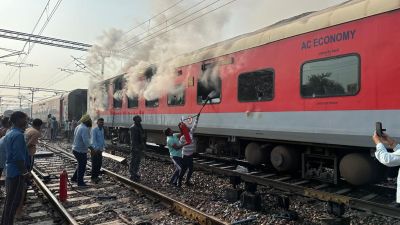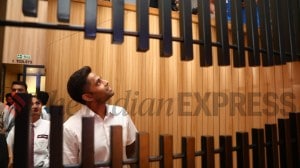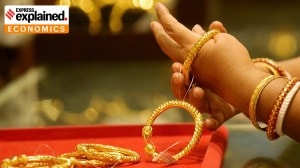Military fact, mostly fiction
As Pakistanis vote in their sixth general election in 17 years, it is pertinent to ask the reasons behind democracy's failure in the country...

As Pakistanis vote in their sixth general election in 17 years, it is pertinent to ask the reasons behind democracy’s failure in the country. Since Field Marshal Ayub Khan’s coup d’etat in 1958, the Pakistani establishment has perpetuated certain myths about why its steadying hand is essential to Pakistan’s survival. Some of the common myths and the truth about them:
Democracy cannot function with low literacy levels: None of the world’s democracies started out with universal literacy. The demand that only people who know how to read and write should be able to vote has often been used by elite groups to disenfranchise the masses. Elected governments in West Bengal and Kerala achieved high literacy rates and currently Bangladesh is improving its literacy rate under democracy. Pakistan, on the other hand, has failed to improve its literacy rate under authoritarian regimes.
Democracy cannot work under a feudal system: Each military regime in Pakistan has cultivated the feudal influential to offset the influence of populist politicians. Ayub Khan appointed the Nawab of Kalabagh as the Governor of West Pakistan to control the movement for democracy. Yahya Khan’s cabinet included feudal civilians.
General Zia encouraged biradari and feudal politics to keep the PPP out of power. And now General Musharraf’s political allies are also the land-owning families of the Punjab. The argument against feudalism is only used as a rallying cry for the urban intelligentsia, which would otherwise find dictatorship unacceptable.
The military steps in when politicians fail: That General Yahya’s coup in 1969, following 10 years of Field Marshal Ayub Khan’s dictatorship is enough to prove this claim wrong. It’s interesting to note that Zia and Musharraf both claim to have taken over reluctantly, in spontaneous coups. But in both cases evidence exists of prior planning. Admiral Faseeh Bokhari, who resigned as Naval chief before Musharraf’s October 1999 coup, has now stated that he resigned because he did not want to be part of the coup. According to him, the coup was being planned long before the drama involving his trip back from Sri Lanka. The politicians’ alleged failures are the excuse, not the reason for military coups in Pakistan. In any case, democracy weeds out the failings of politicians over a period of time.
Pakistan’s political parties are personality cults: Pakistan had two large national parties in 1958, the conservative Muslim League and the progressive Awami League. Ayub Khan split the Muslim League to create his own faction. General Zia engineered a similar division in the party. The PML has been split since then, primarily due to behind-the-scenes machinations of the intelligence services.
Pakistani politics is characterized by horse-trading: Horse-trading started under the pre-martial law regime of Maj General Iskander Mirza and continued under Ayub Khan and General Zia. The covert operations of the intelligence services during the last ten years forced shifting of political loyalties as attempts were made to destabilize elected governments. Recently, General Musharraf’s regime has used inducements to force politicians to change loyalties while creating the PML-QA.
Civilian rulers have been more authoritarian and corrupt: Under Ayub Khan, the press was totally controlled and the opposition was denied breathing space. Nawab Kalabagh had Jamaat-e-Islami leader Maulana Maududi fired upon. An assassination attempt on opposition politician Abdul Baqi Baloch resulted in the death of a journalist travelling with him.
General Yahya’s regime practiced such brutal repression in then East Pakistan that it opted to become Bangladesh. Oppression of the opposition, especially the PPP, under General Zia’s regime was severe and widespread. The repressive tactics often associated with Zulfikar Ali Bhutto were all a continuum of the Ayub era.
The same is true of corruption. Corruption of civilian regimes is used by the military to justify its own ventures. In any case, corruption in most civilised nations is dealt with by law not by overthrowing the legally established order.
Pakistan’s political governments have all been disasters. Pakistan only surplus budgets came under civilian governments before 1958. The Zulfikar Ali Bhutto regime, despite its flaws, opened the doors for economic prosperity for millions by opening travel opportunities for all Pakistanis. Mohammed Khan Junejo laid the foundations of a free press. Benazir Bhutto’s first government paved the way for the communications revolution by opening the market for pagers, cellular phones and CNN.
Nawaz Sharif’s first administration seriously started privatisation. Bhutto’s second government eliminated polio. But none of these achievements is discussed because the establishment constantly hammers home the obvious faults of the civilian regimes while hiding the military regime’s weaknesses.
Gen Ayub Khan introduced the political culture of intimidating opponents. Gen Yahya Khan presided over the break up of Pakistan. Gen Zia ul Haq introduced the Kalashnikov culture and Islamic militancy. Gen Musharraf’s rule has seen a 10 per cent rise in the number of those living below the poverty line.
The military is Pakistan’s institution of last resort: It need not be so. Pakistan’s judiciary started crumbling when the military advised then Chief Justice Munir to support Governor General Ghulam Mohammed against the constituent assembly in 1954. Ayub and Zia both pressured judges to give verdicts of their choice. General Musharraf, too, has sought legitimacy from a Supreme Court he reconstituted after his military takeover.
(Husain Haqqani is a Visiting Scholar at the Carnegie Endowment for International Peace in Washington DC. He served as adviser to Nawaz Sharif and Benazir Bhutto and as Pakistan’s ambassador to Sri Lanka)






- 01
- 02
- 03
- 04
- 05

























